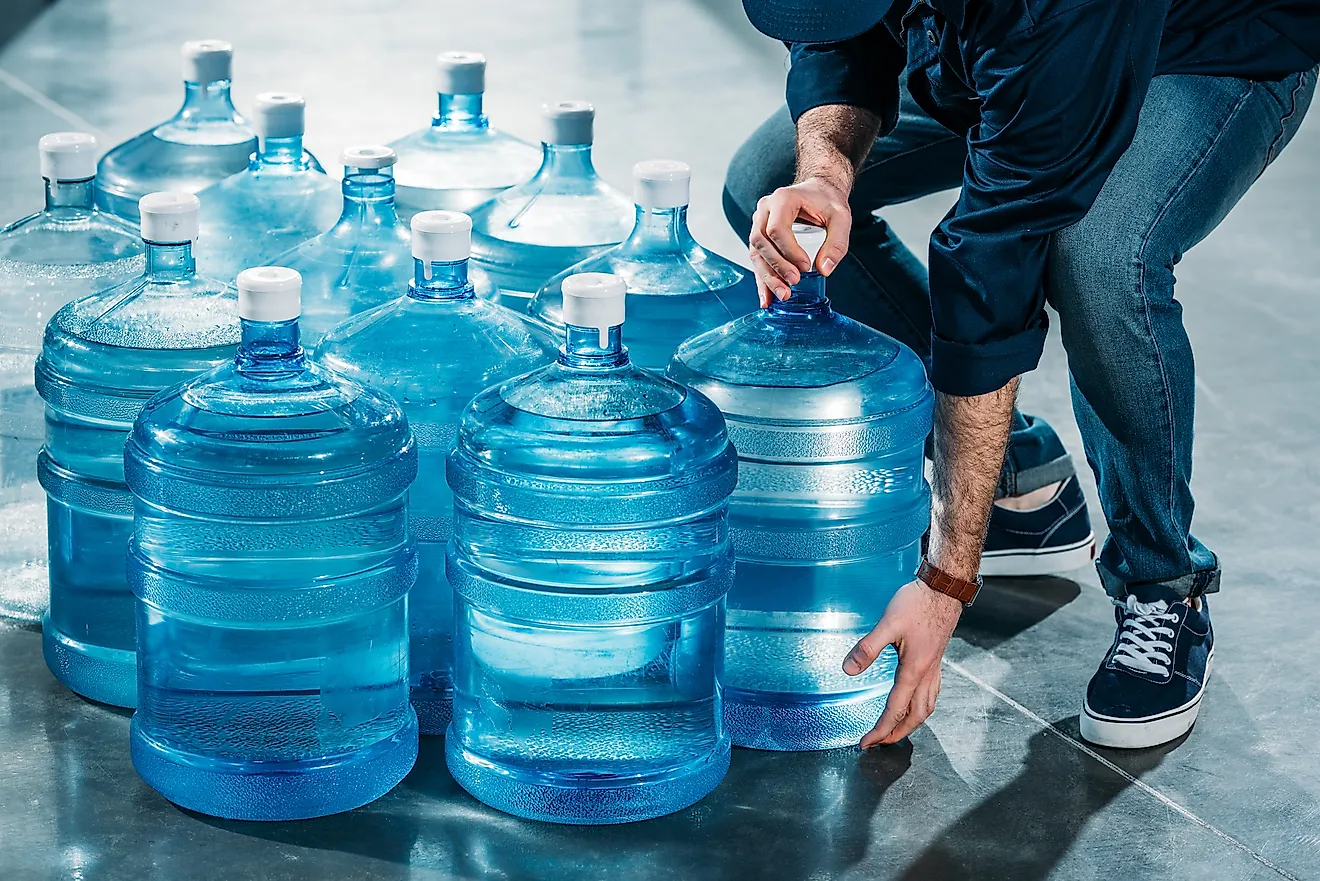Five gallons of water weighs approximately 41.7 pounds or 18.9 kilograms. This weight may vary depending on the temperature and density of the water.
Water is a fundamental necessity for all living things, and knowing its weight is essential in many situations. People often need to know the weight of water to determine how much they can lift, how much water they need to transport, or even to calculate the volume of a water container.
Additionally, understanding the weight of water is especially crucial for industries that rely on the transportation or distribution of large volumes of water, such as agriculture, food processing, and construction. Overall, knowing how much 5 gallons of water weighs can be a helpful piece of information in both professional and personal settings.

Credit: www.worldatlas.com
Understanding The Weight Of Water
Water is essential to life, regardless of whether you’re a human, animal, or plant. Many people don’t realize that water has a weight that can vary depending on certain factors, including its measurement, density, and temperature. In this section, we’ll take an in-depth look at how these factors can affect the weight of water.
Explanation Of How Water Is Measured By Weight And Volume
Water can be measured by weight or volume, with each method having its advantages and disadvantages. Here’s what you need to know:
- When measuring by weight, one gallon of water weighs approximately 8.34 pounds (3.78 kg).
- When measuring by volume, one gallon of water takes up 231 cubic inches (3.785 l) of space.
- One cubic foot of water weighs approximately 62.4 pounds (28.3 kg).
Discussion Of The Density Of Water And How That Affects Its Weight
The density of water can also affect its weight, with pure water having a density of 1 gram per cubic centimeter (g/cm³) at 4 degrees celsius. Here’s what you need to know:
- The density of water increases as it gets colder, until it reaches its maximum density at 4 degrees celsius.
- If water is chilled below 4 degrees celsius, it becomes less dense, and its weight decreases. Conversely, if water is heated above 4 degrees celsius, it becomes less dense, and its weight increases.
- Saltwater is denser than freshwater, meaning that saltwater weighs more than an equal volume of freshwater.
How The Temperature Of Water Can Affect Its Weight
The temperature of water can also significantly affect its weight, as we briefly mentioned earlier. Here’s a closer look:
- As mentioned, water is the most dense at 4 degrees celsius. Therefore, the weight of one gallon of water at 4 degrees celsius would be higher than one gallon of water at any other temperature.
- The weight of one gallon of boiling water (212 degrees fahrenheit or 100 degrees celsius) is less than one gallon of cold water (32 degrees fahrenheit or 0 degrees celsius). This is because the water molecule’s kinetic energy increases as the temperature increases, causing it to spread out and become less dense.
- Finally, the temperature of water can also affect temperature measurements. So, you should ensure that the measurement of temperature is accurate when calculating the weight of water.
Understanding the weight of water is essential in various settings, from cooking to science experiments. Knowing how temperature, density, weight, and volume are interrelated can help you make better choices when measuring water, leading to more consistent and accurate results.
Calculation Of The Weight Of 5 Gallons Of Water
Are you wondering how much 5 gallons of water weighs? Look no further, as we have got you covered! In this section, we will provide you with a step-by-step guide on how to calculate the weight of 5 gallons of water, and also explain the formula used to calculate the weight of any quantity of water.
Step By Step Guide On How To Calculate The Weight Of 5 Gallons Of Water
Here’s a handy guide to help you calculate the weight of 5 gallons of water:
- Firstly, determine the weight of one gallon of water. One gallon of water weighs approximately 8.34 pounds (lb) or 3.78 kilograms (kg).
- Next, multiply the weight of one gallon of water by 5 to get the weight of 5 gallons of water.
- Finally, you will get the weight of 5 gallons of water. The weight of 5 gallons of water in pounds is 41.7 lb (8.34 lb x 5), and in kilograms, it is 18.9 kg (3.78 kg x 5).
Discussion Of The Formula Used And How To Apply It For Any Quantity Of Water
The formula to calculate the weight of any quantity of water is quite simple. You can use the following formula:
Weight of water (in lbs or kgs) = volume of water (in gallons) x weight of one gallon of water (in lbs or kgs)
Simply put, to calculate the weight of any quantity of water:
- Determine the volume of water in gallons.
- Identify the weight of one gallon of water in pounds or kilograms, which is 8.34 lb or 3.78 kg respectively.
- Multiply the volume of water by the weight of one gallon of water to calculate the weight of water.
You can use this formula to calculate the weight of any quantity of water, from as low as half a gallon to as high as several thousand gallons, without much hassle.
Calculation Of The Weight Of 5 Gallons Of Water In Pounds And Kilograms
Using the formula discussed above, we can calculate the weight of 5 gallons of water:
- 5 gallons of water weigh 41.7 lb (8.34 lb x 5) in pounds.
- 5 gallons of water weigh 18.9 kg (3.78 kg x 5) in kilograms.
Now you know how much 5 gallons of water weigh! Whether you require the weight of water for scientific purposes or just for general knowledge, the formula and guide we have provided should make the calculation easy for you.
Practical Applications
The weight of water is a crucial aspect in various scenarios, especially when it comes to transportation, construction, and survival. Here are some of the most real-world applications that you may encounter, wherein understanding the weight of 5 gallons of water would be useful.
- Transportation: If you are shipping or bringing water with you, knowing its weight is essential to determine the load capacity of your vehicle. For instance, if you are using a pickup truck, the weight of 5 gallons of water is equivalent to around 40 pounds. Thus if you plan on carrying 10 gallons of water, you know that you’ll be carrying almost 80 pounds that would affect your vehicle efficiency.
- Construction: Understanding how much water weighs is also crucial in construction, especially when it comes to mixing concrete. If you have a certain maximum weight capacity in preparing the concrete mix, and you need a particular amount of water, you’ll have to know the equivalent weight of it.
- Survival: If you’re out in the wilderness with no source of water in sight, knowing how much 5 gallons of water weighs can come in handy. It can help you determine what essentials you need to bring with you, how much water is needed for drinking or cooking, and how much you can carry without it hindering your mobility.
Examples Of Usage
Knowing the weight of 5 gallons of water can provide an accurate measurement for different purposes – from cooking to storage. Here are some of the notable examples:
- Fish tanks: If you’re an aquarium hobbyist, 5 gallons of water weighs nearly 42 pounds. Understanding how much 5 gallons of water weigh can help you maintain the appropriate weight limit for your aquarium stands or tables.
- Bottled water: Five gallons of water weighs 40 pounds. If you’re running a business involving water delivery services, understanding the weight of water can help determine the number of bottles to distribute per delivery or capacity your team can carry.
Comparison With Other Commonly Weighed Items
Visualizing the weight of 5 gallons of water can be challenging for some. Here is a brief comparison of its weight with other commonly weighed items:
- 5 gallons of water weights around the same as two large watermelons.
- The weight of 5 gallons of water is approximately equal to one-fourth of an average human’s weight.
- A gallon of milk weighs around 8.6 pounds; thus, 5 gallons of milk approximately equals 43 pounds.
Understanding how much 5 gallons of water weighs is essential for a myriad of purposes. From transportation to mixing concrete, knowing the weight of water can help you plan and execute your activities. Additionally, the weight of 5 gallons of water provides a useful benchmark for comparison with other commonly weighed items.
Frequently Asked Questions For How Much Does 5 Gallons Of Water Weigh?
How Many Pounds Do 5 Gallons Of Water Weigh?
When measuring liquid, we use pounds per gallon. Water weighs approximately 8. 34 pounds per gallon, so 5 gallons of water would weigh around 41. 7 pounds.
How Much Water Is In A 5-Gallon Bucket?
A 5-gallon bucket can hold up to 5 gallons of water, which equals around 640 ounces or 18. 9 liters of water.
How Much Space Does 5 Gallons Of Water Take Up?
Liquid water takes up the same amount of space as its container, which is 5 gallons for a 5-gallon container. However, water expands as it freezes, so it will take up more space when frozen.
How Long Does It Take To Fill A 5-Gallon Jug?
The time it takes to fill a 5-gallon jug depends on the water pressure and flow rate. With a typical flow rate of 8 gallons per minute, it would take around 37. 5 seconds to fill a 5-gallon jug.
How Much Does A Gallon Of Water Cost?
The cost of a gallon of water varies depending on the location and method of delivery. In the us, tap water costs less than a penny per gallon, while bottled water can range from a few cents to several dollars per gallon.
Conclusion
The weight of 5 gallons of water is equivalent to roughly 41. 7 pounds, which can be significant when it comes to transportation, storage and everyday use. Understanding the weight of water is essential for various activities such as camping, hiking, and home renovations.
Whether you’re purchasing water for drinking or using water for a project, it’s crucial to be aware of how much water can reasonably be handled. By knowing the weight of water, you can avoid accidents and safely manage your tasks.
As water is an essential resource for sustainable living, awareness about how much it weighs is vital. Enhancing your knowledge about the weight of water can save you from various challenging situations, as well as promote a responsible attitude towards the environment.
